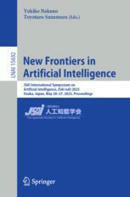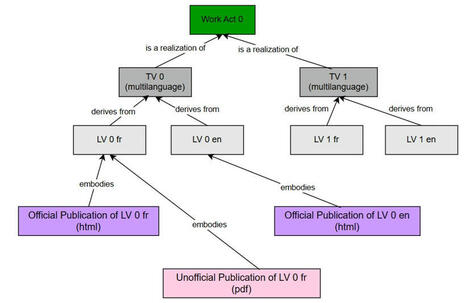 Your new post is loading...

|
Scooped by
Stéphane Cottin
August 19, 2024 9:36 AM
|
Ce guide méthodologique a été conçu pour fournir : • une cartographie des gisements d’informations disponibles pour toutes les sources du droit français, du droit de l’Union européenne et du droit international (législation, jurisprudence, doctrine), • une description plus détaillée des données et outils essentiels, accompagnée de trucs et astuces pour une utilisation efficace, • une méthode de travail adaptable à tous les types de recherche et des conseils plus pointus pour des requêtes et investigations spécialisées.Le corps du texte s’accompagne d’outils permettant d’acquérir des compétences en recherche d’information juridique : des copies d’écran illustrent les procédures, des résumés permettent de mémoriser les points essentiels, des focus approfondissent certains aspects plus complexes. Privilégiant la pratique et une approche la plus concrète possible, l’ouvrage devrait être utile à l’étudiant en licence ou master, au professionnel du droit ou de l’information juridique. Au-delà, il devrait intéresser toute personne souhaitant : • se former à la recherche documentaire juridique, • vérifier ou actualiser ses connaissances dans le domaine, • former des étudiants à ce type de recherche, • mesurer l’impact de l’intelligence artificielle sur la recherche d’information juridique.

|
Scooped by
Stéphane Cottin
June 28, 1:27 PM
|
La giurimetria, l'intelligenza artificiale (IA) e la giustizia predittiva sono argomenti che suscitano sempre più interesse in campo giuridico.

|
Scooped by
Stéphane Cottin
June 25, 3:41 PM
|
This article explores the concept and practical significance of amicus curiae (friend of the court) in legal proceedings. It examines how third parties, thou

|
Scooped by
Stéphane Cottin
June 23, 6:14 PM
|
With the increasing digitization of judicial proceedings, courts worldwide have assumed non-traditional responsibilities as “data governors” to manage the life

|
Scooped by
Stéphane Cottin
June 19, 1:34 AM
|
Long-form legal reasoning remains a key challenge for large language models (LLMs) in spite of recent advances in test-time scaling. We introduce LEXam, a

|
Scooped by
Stéphane Cottin
June 17, 5:25 AM
|
L’association Juriconnexion vous propose un document de présentation sur l’Open Data des décisions judiciaires, la chronologie, les portails consultables et ce que vous pouvez y trouver. Open da quoi ? « La mise à disposition des décisions de justice, plus communément désignée par l’expression « open data des décisions de justice », vise à rendre disponibles à tous, à […]

|
Scooped by
Stéphane Cottin
June 15, 4:04 PM
|
7 JUILLET 1997. - Arrêté royal relatif à la publication [des arrêts et des ordonnances de non-admission] du Conseil d'Etat. (NOTE : Consultation des versions antérieures à partir du 08-08-1997 et mise à jour au 15-06-2011)

|
Scooped by
Stéphane Cottin
June 11, 4:21 PM
|
Legal scholarship is overly abstract and theoretical, making it unhelpful to judges and lawyers. That, at least, is the common critique from the bench. When it

|
Scooped by
Stéphane Cottin
June 10, 1:21 AM
|
In her essay, A New Parlor is Open: Legal Writing Faculty Must Develop Scholarship on Generative AI and Legal Writing, Dr. Kirsten Davis questions the as

|
Scooped by
Stéphane Cottin
June 9, 4:08 PM
|
Almost all users despise The Bluebook, and the twenty-second edition will do little to end this hatred. Despite all of the criticism,

|
Scooped by
Stéphane Cottin
June 4, 2:18 AM
|
We develop an agent-based model to investigate the mechanisms that determine state compliance with European Court of Human Rights judgments. Tasked with upholdi

|
Scooped by
Stéphane Cottin
May 29, 12:23 PM
|
This study investigates whether AI and ML tools can support European legislative drafting with advanced information retrieval using AI and which methods are more effective. The article shows the hybrid methods leveraging the combination of LegalXML-annotate

|
Scooped by
Stéphane Cottin
May 22, 5:29 PM
|
This chapter surveys developments related to the use of generative AI in courts in the United States. It discusses a range of current uses of generativ
|

|
Scooped by
Stéphane Cottin
June 30, 2:13 PM
|
Natural Language Processing (NLP) is transforming legal firms by enhancing legal text analysis, legal document management, and judicial decision prediction. Conventional rule-based and statistical methods lack the contextual understanding, and scalability required for processing complex legal texts, while deep learning and transformer-based models have revolutionized advanced Legal Artificial Intelligence (LegalAI) technologies. Large Language Models (LLMs), including BERT, GPT, LLaMA, and domain-specific transformers like Legal-BERT and CaseLaw-BERT, have refined the state-of-art models in legal NLP tasks like legal text classification, legal text summarization, and judgment prediction. This study analyzes 40 selected journals and conference papers from 2017 to 2024, emphasizing the developing research interest in LLM-based legal applications. Major developments consist of hierarchical transformers, rhetorical role classification, and legal knowledge graphs that facilitate legal text parsing and logical inference. This paper spans intellectual breakthroughs with real-world applications by reviewing LLMs and Knowledge Graphs (KG) for legal NLP, providing key findings for scholars and experts working on AI-driven legal systems.

|
Scooped by
Stéphane Cottin
June 26, 7:15 PM
|
Over its decades long history, the field of AI and Law has made significant progress developing and researching formal models of case based reasoning that are c

|
Scooped by
Stéphane Cottin
June 25, 3:41 PM
|
Doctrinal research method is generally used in legal research. This method includes compilation, analysis, synthesis and opinion methods. The steps to be follow

|
Scooped by
Stéphane Cottin
June 23, 2:36 PM
|
Artificial Intelligence (AI) is reshaping access to justice by offering cost-effective, scalable tools that can support legal decision-making and information de

|
Scooped by
Stéphane Cottin
June 18, 1:12 PM
|
Is Generative AI any good at legal writing? The answer to that question has major implications for legal practice and legal education. If Generative AI

|
Scooped by
Stéphane Cottin
June 17, 4:47 AM
|
Database tracking legal cases where generative AI produced hallucinated citations submitted in court filings.

|
Scooped by
Stéphane Cottin
June 13, 1:46 AM
|

|
Scooped by
Stéphane Cottin
June 10, 1:55 PM
|

|
Scooped by
Stéphane Cottin
June 9, 4:14 PM
|
Legal Research Demystified provides a practical approach to legal research. The textbook guides law students through eight steps to research common law i

|
Scooped by
Stéphane Cottin
June 4, 2:20 AM
|
The Supreme Court of the United States (SCOTUS) issues 10-15 % of its opinions unsigned, concealing authorship. Traditionally, unveiling authors required the po

|
Scooped by
Stéphane Cottin
May 29, 2:12 PM
|
Law school grading practices often conflict with legal research instruction goals. Small class sizes render norm-referenced (curved) grading unreliable, and the

|
Scooped by
Stéphane Cottin
May 27, 3:21 AM
|
This book constitutes the proceedings of the 17th JSAI International Symposia on Artificial Intelligence (JSAI-isAI 2025), held in Osaka, Japan, during May 26–27, 2025. The 27 full papers included in this book were carefully reviewed and selected from 82 submissions. The papers covered a wide range of topics, including AI & law, juris-informatics, natural language processing for scientific documents, Information retrieval for scientific documents, business Informatics, agent-based modeling, AI & security, AI & privacy.

|
Scooped by
Stéphane Cottin
May 21, 1:01 AM
|
This article is a companion to How I Learned to Stop Worrying and Love the Bot: What I Learned About AI and What You Can Too. This a
|

 Your new post is loading...
Your new post is loading...














